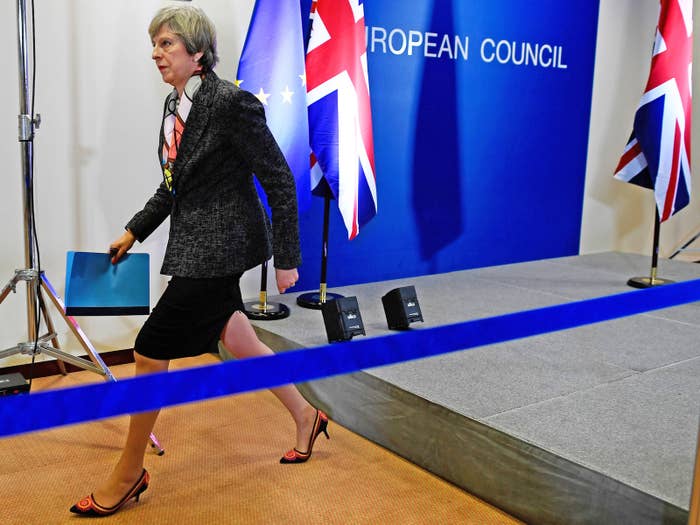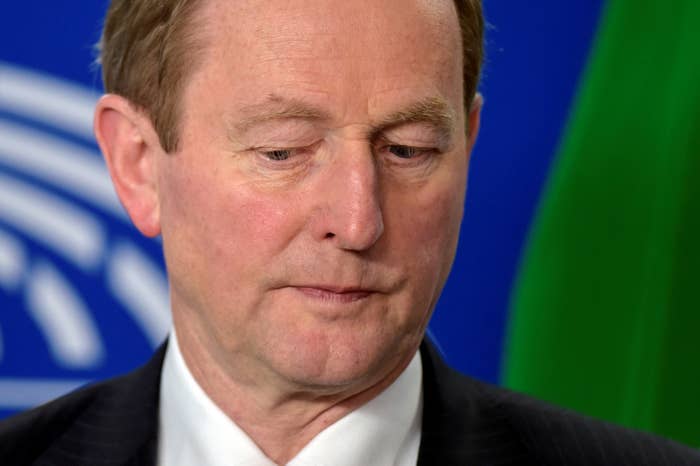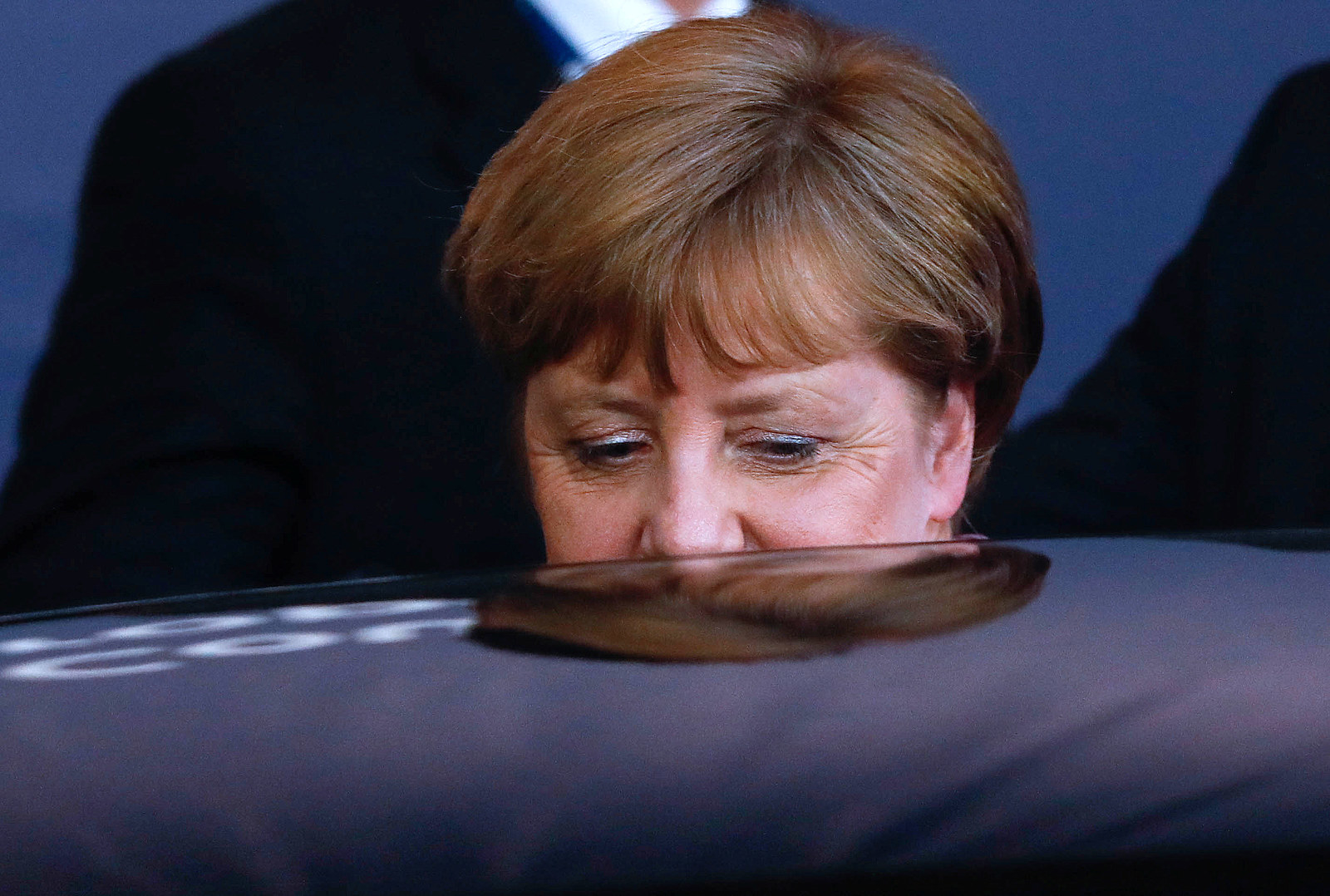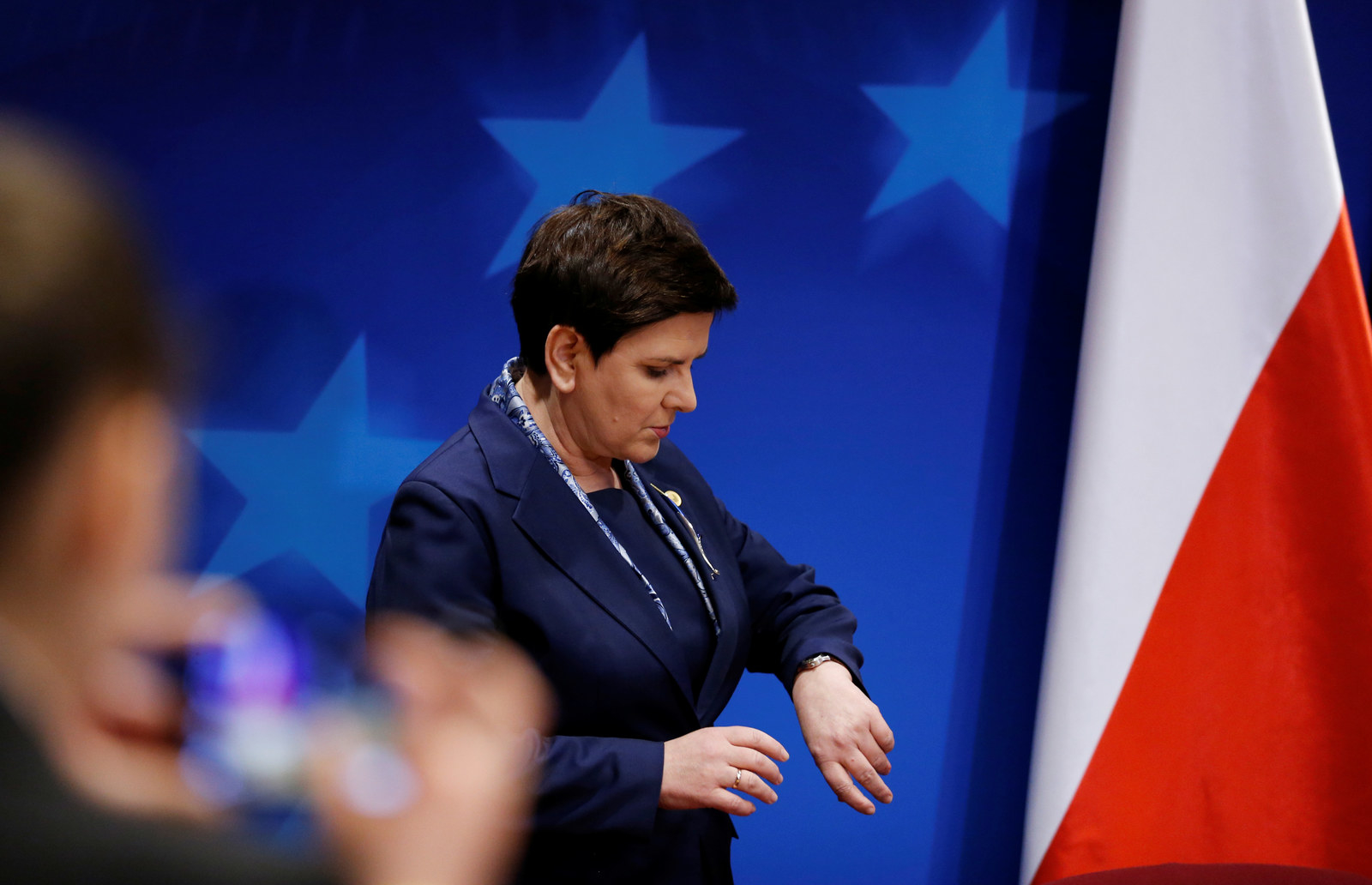
BRUSSELS – When Theresa May invokes Article 50 later this month, she will set in motion a two-year countdown to Britain’s exit from the European Union. But there will not be ringing bells and fireworks from Europe’s capitals when she finally pulls the trigger. Initially, the prime minister will be met mostly by silence.
BuzzFeed News has spoken to senior EU and European government officials to get a sense of how they intend to handle the Article 50 announcement and how they see the negotiations unfolding from there.
The EU’s remaining 27 members will provide only an initial reaction some 48 hours later. Twenty-four hours after that, it will be the European Commission’s turn. A series of recommendations compiled by the EU’s chief Brexit negotiator, Michel Barnier, are expected to be shared with the 27 capitals.
Then, following preparatory consultations lasting about three weeks, the 27 leaders will meet for a summit in April (on the 6th if she triggers by 15 March) to finalise a common position. After the summit, and with France not electing a new president until 7 May, an additional month is likely to be needed to firm up the position into negotiating directives.
The clock will be ticking from the moment Theresa May sends the formal Article 50 notification this month, but negotiations proper are unlikely to commence before mid-May.
It is understood that the EU, backed by the 27 governments, will angle for the first half of negotiations to focus on the terms of divorce, before any talk of a trade deal can begin. “We need to sort out the past before any talk can be had about the future relationship,” an EU official told BuzzFeed News.
After that, the seven remaining months of this year will concentrate primarily on three matters. First, agreeing a methodology to calculate the UK’s so-called “Brexit bill” (the UK share of pending EU budget commitments). Though various reports put the figure at around €40–60 billion, Brussels wants the scope of initial discussions not to fixate on a number but instead for there to be an understanding on how to calculate the bill, and over what period of time the UK would settle it.
Second, both sides want an agreement on the principles that will guarantee the right of EU citizens to stay in the UK after Brexit, as well as reciprocal rights for Britons living elsewhere in the EU.
And third, both sides are keen for a solution to be found early in Northern Ireland, where questions linger over whether a border with the Republic of Ireland will need to be reintroduced.
If an agreement can be reached around these three areas this year, the talks will be able to then move on to a twin track: figuring out the details of withdrawal in parallel to beginning trade negotiations.
But it will not be easy.

In Northern Ireland, all sides mostly agree on the principles. There is no intention whatsoever to hamper the peace settlement. Still, workable solutions over how to manage a border between a country that is in the single market and enjoys freedom of movement, and one that isn’t in the single market and has made putting an end to freedom of movement its guiding star, have so far been in short supply.
Meanwhile, guaranteeing the rights EU nationals in Britain (and Britons living elsewhere in the EU) currently rely on will be far from straightforward. Suggestions that an “everything will be fine”-type arrangement would suffice have been widely dismissed. From establishing what determines residency to guaranteeing acquired rights, the details of any agreement will not be simple.
The most contentious issue to untangle in the early stage of negotiations is likely to be Britain’s Brexit bill. Leading Brexiteers, including foreign secretary Boris Johnson, have rejected suggestions the UK could be left with a £50 billion bill. EU officials, meanwhile, are adamant that Britain will have to stick to its commitments.
"When you sign on for a contract you commit yourself to participation. And obviously the extent of that level of money will be determined," Ireland's prime minister Enda Kenny told reporters in Brussels on Thursday.
A number of officials have been left confused by how Britain is entering into negotiations. They see the possibility that arguments about the bill could grind the overall talks to a halt. "The UK should be happy about the 60 billion number. It can then negotiate it down and present it as a win. And there will be compromise. But if the UK says it wants to pay zero, it will lose that negotiation, and it will end badly,” one EU diplomat told BuzzFeed News.

When Britons voted to leave the EU last June, most European capitals were shocked. Attitudes have since stiffened. Among the EU’s remaining member states, disorientation has been replaced with declarations of unity on how to approach Brexit, agreement on core principles, and a focus on the future of an EU27.
For Europe’s largest member states, Brexit has become just another issue to deal with – and one that is not top of the list.
“It is really important to understand that in Germany there isn't an obsession over Brexit as there is in Britain. For Germany, it’s not even a top-five issue. The chancellor will be thinking about China, Russia, America, Africa, and the unity of the 27 above all else, and now rising tensions in the Western Balkans. These are her priorities, it is what she thinks about,” a second diplomat told BuzzFeed News.
“Germany, together with the other member states, will set the guidelines and the principles, and then Brexit is something for Barnier to figure out,” they added.
Even officials from previously more outspoken governments now claim there is agreement over the core negotiating principles, such as the indivisibility of the EU’s four freedoms (of movements of goods, services, people, and capital) and the need for any arrangement with the EU to be inferior to membership.
Still, smaller countries remain anxious about a number of matters, especially relating to security. A third diplomat noted how in meetings with British officials, the UK never fails to mention its role in security and defence cooperation as well as its contribution to NATO. The same diplomat also told BuzzFeed News it was clear that the UK was targeting a specific set of countries through one-to-one meetings with the goal of trying to divide the 27. Other countries with a high number of nationals living in the UK will be particularly nervous about their citizens’ rights, the diplomat said.

Brexit was not on the agenda at this week’s European Council of heads of state and government. Even during the leaders’ customary press conferences, it was hardly mentioned. Instead, the summit was partly overshadowed by Poland’s sulking. After failing to block the re-election of council president Donald Tusk (the former Polish prime minister was backed by all other 27 member states), officials in Warsaw lashed out, while Polish prime minister Beata Szydło refused to endorse the summit’s formal conclusions.
Poland was left isolated, including by its traditional Visegrad allies (Hungary, Slovakia, and the Czech Republic). Conclusions were issued via a workaround, and the whole incident dismissed by most as domestic politics.
Still, some officials suggest the episode doesn’t bode well for an EU that is working to put on a show of unity in Italy later this month, where the EU's member states will meet (without the UK) to celebrate the 60th anniversary of the signing of the Treaty of Rome, the EU's founding document. "A celebration of 26 and a half member states in Rome wouldn’t be a good look," a senior European government official told BuzzFeed News.
As Europe charts a future without the UK, there remain differences between the 27 on the direction to take. And these will always sit alongside domestic issues each has to deal with, not least a packed electoral calendar starting with votes in the Netherlands, France, and Germany.
Of course, the UK will have its own domestic challenges to untangle as it negotiates, as well as an economy that is likely to slow. Some suggest a second Scottish independence referendum is inevitable. The latest polls show Scotland’s electorate is now split down the middle. One senior EU official BuzzFeed News spoke to in Brussels described an independent Scotland’s chances of joining the EU as a “slam dunk”.
Even ignoring the politics and posturing, most of the officials BuzzFeed News spoke to emphasised how complicated the upcoming negotiations will be, and a widespread worry the UK may be underestimating the numerous technical aspects and challenges that lie ahead, as well as their longer term impact on Britain’s economy.
“Even if there is agreement on the more political issues, such as budget commitments, followed by the intention to conclude a free trade agreement on goods and services, there are so many other considerations,” one official said, citing among others future rules, oversight and arbitration, environmental implications, leaving bodies like the EU’s atomic energy community, non-tariff barriers, a review of the UK’s role in existing EU trade deals, and scores of standards. “In many of these areas, the UK would have to abide by the rules, including when they change, but would not have a say,” the official added.
A second EU official suggested they were noting a change in tone from London as officials were slowly coming to terms with the complexities of Brexit, but warned: “There are so many complicated issues along the way, all with consequences that will need to be dealt with that make closing a deal in two years unlikely.
“It also means there are lots of places where everything can just fall apart.”
